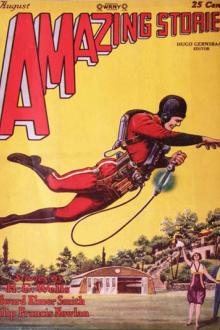The Skylark of Space - E. E. Smith (e book reading free txt) 📗

- Author: E. E. Smith
Book online «The Skylark of Space - E. E. Smith (e book reading free txt) 📗». Author E. E. Smith
“Every bit of mechanism we had occasion to use worked perfectly,” Crane stated proudly. “We did not find it necessary to change any of our apparatus and we hope to make a longer flight soon. The hour we took on this trip might easily have been only a few minutes, for the Lark did not even begin to pick up speed.”
Shiro looked at Crane with an air of utter devotion and bowed until his head approached the floor.
“Sir,” he said in his stilted English. “Honorable Skylark shall be marvelous wonder. If permitting, I shall luxuriate in preparing suitable refreshment.”
The permission granted, he trotted away into the house, and the travelers invited their visitors to inspect the new craft. Crane and the older man climbed through the circular doorway, which was at an elevation of several feet above the ground. Seaton and Dorothy exchanged a brief but enthusiastic caress before he lifted her lightly up to the opening and followed her up a short flight of stairs. Although she knew what to expect, from her lover’s descriptions and from her own knowledge of “Old Crip,” which she had seen many times, she caught her breath in amazement as she stood up and looked about the brilliantly-lighted interior of the great sky-rover. It was a sight such as had never before been seen upon earth.
She saw a spherical shell of hardened steel armor-plate, fully forty feet in diameter; though its true shape was not readily apparent from the inside, as it was divided into several compartments by horizontal floors or decks. In the exact center of the huge shell was a spherical network of enormous steel beams. Inside this structure could be seen a similar network which, mounted upon universal bearings, was free to revolve in any direction. This inner network was filled with machinery, surrounding a shining copper cylinder. From the outer network radiated six mighty supporting columns. These, branching as they neared the hull of the vessel, supported the power-plant and steering apparatus in the center and so strengthened the shell that the whole structure was nearly as strong as a solid steel ball. She noticed that the floor, perhaps eight feet below the center, was heavily upholstered in leather and did not seem solid; and that the same was true of the dozen or more seats—she could not call them chairs—which were built in various places. She gazed with interest at the two instrument boards, upon which flashed tiny lights and the highly-polished plate glass, condensite, and metal of many instruments, the use of which she could not guess.
After a few minutes of silence both visitors began to ask questions, and Seaton showed them the principal features of the novel craft. Crane accompanied them in silence, enjoying their pleasure, glorying in the mighty vessel. Seaton called attention to the great size and strength of the lateral supporting columns, one of which was immediately above their heads, and then led them over to the vertical column which pierced the middle of the floor. Enormous as the lateral had seemed, it appeared puny in comparison with this monster of fabricated steel. Seaton explained that the two verticals were many times stronger than the four laterals, as the center of gravity of the ship had been made lower than its geometrical center, so that the apparent motion of the vessel and therefore the power of the bar, would usually be merely vertical. Resting one hand caressingly upon the huge column, he exultantly explained that these members were “the last word in strength, made up of many separate I-beams and angles of the strongest known special steel, latticed and braced until no conceivable force could make them yield a millimeter.”
“But why such strength?” asked the lawyer doubtfully. “This column alone would hold up Brooklyn Bridge.”
“To hold down the power-plant, so that the bar won’t tear through the ship when we cut her loose,” replied Seaton. “Have you any idea how fast this bird can fly?”
“Well, I have heard you speak of traveling with the velocity of light, but that is overdrawn, isn’t it?”
“Not very much. Our figures show that with this four-hundred-pound bar”—pointing to the copper cylinder in the exact center of the inner sphere—“we could develop not only the velocity of light, but an acceleration equal to that velocity, were it not for the increase in mass at high velocities, as shown by Einstein and others. We can’t go very fast near the earth, of course, as the friction of the air would melt the whole works in a few minutes. Until we get out of the atmosphere our speed will be limited by the ability of steel to withstand melting by the friction of the air to somewhere in the neighborhood of four or five thousand miles per hour, but out in space we can develop any speed we wish, up to that of light





Comments (0)